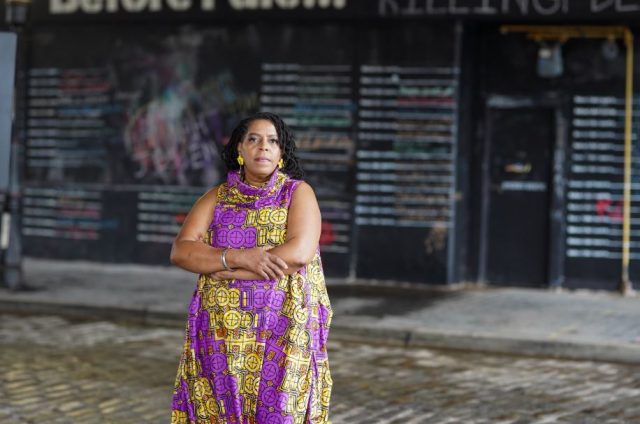
By Sydney Melson
The Birmingham Times
In domestic abuse situations, many women lose one important aspect of their well-being—themselves, said Tina Thornton, founder of a nonprofit in Birmingham that helps survivors heal.
Her group, Survivors Overcoming Life Experiences (SOLE) Recovery, is designed to help women who are affected by unhealthy relationships and behaviors by providing support that equips them with real-time solutions. Many women have their identity stolen in the process of domestic abuse, Thornton said, so the process of finding themselves is crucial.
SOLE’s faith-based, holistic approach to healing allows individuals to resolve their problems or find refuge, she said. “There’s a lot of self-reflection to encourage them to step beyond what they’ve been told or what they believe.”
And Thornton would know.
The SOLE Recovery founder is a domestic abuse survivor and remembers being part of a program that talked about domestic violence, but not in detail.
“We would review the same information week after week on the dynamics of domestic violence but never the root condition that allowed me to be in the line of fire,” she said.
That led Thornton, an ordained minister and counselor, to create her own organization and use creative ways to offer services. For example, instead of having people tell stories during Domestic Violence Awareness Month in October, Thornton’s group focused on coping.
“Oftentimes, we talk to women that have heard other traumatic experiences, and that kind of paralyzes them because they fear everything that happens to the individual could be their story, as well. We navigated away from telling stories because it doesn’t show them how to avoid it,” she said.
Outlook on Life
Thornton’s upbringing molded her outlook on life.
“My grandparents raised me up until age 7 or 8. My grandfather was very controlling, and my grandmother was very suppressed, so I chose to adopt that behavior,” Thornton said. “My mother was also aggressive, so I chose a more passive demeanor, which led me to more aggressive or controlling people who were hungry for power, and I submitted to that.”
Thornton said the unhealthy dynamics she was exposed to in her household led to low self-esteem and made her more vulnerable to abuse.
“I was in one [abusive] marriage for eight years and in another for 21 years. I never took a break to heal,” she said. “That’s a pattern for women. It’s dependency and reliance on your partner.”
In her second marriage, which lasted from 1990 to 2011, Thornton said there were financial struggles in addition to the abuse.
“I didn’t really believe I could just leave my marriage. I was taught to believe that my marriage could be repaired. I believed in the beautiful home and the picket fence,” she said.
When her two children were exposed to the damages of abuse in that second marriage, Thornton knew it was time to leave.
“That was my exit,” she said. “The situation had worsened, and I needed to find some level of freedom. … [As a result of my second marriage], I spent quite some time trying to understand the dynamics of my own relationship. In that quest, I was able to find that I personally overlooked the systemic issues in my life.”
Thornton said it’s been nine years since she divorced her second husband, and having the ability to spend time with women in different levels of their own journeys allowed her to address her own.
“The thing I needed the most during that time [of abuse] was that peer opportunity, which wasn’t there,” she said.
And that’s what SOLE Recovery now offers.
Getting to a “Healthy Place”
Thornton started her outreach in 2004 through a program called Gem Kreations, a ministry in churches designed specifically to discuss domestic violence and conflict resolution; the name was changed to SOLE Recovery in 2017.
“Before COVID-19, SOLE Recovery met once a month at the [Memorial Park] recreation center on 6th Avenue South in Birmingham,” she said. “We talk about stress and anxiety, uncertainty, fears we have dealt with. We also do a walk at the [Shades Creek Greenway, known as the Lakeshore Trail] every third Saturday of the month for an opportunity to connect with other women, … to see [each woman’s] mental state and find out how each one is coping.”
Getting people to a “healthy place” is important, said Thornton.
“It’s important to not just go over the steps of violence, because it’s so much bigger than understanding domestic violence,” she said. “A lot of times [in counseling], people ask you to unpack your bags. You’re asked to tell your story, and women are sitting there torn apart while people are observing them. I think healing has to take place before those stories are told. Tell their healing process. It’s a demonstration of hope and perseverance.”
Survivors Overcoming Life Experiences (SOLE) Recovery is currently on Facebook, and people can reach out to the Facebook page to inquire about their services. Tina Thornton can be reached at sole.tinathornton@gmail.com.
Updated at 12:22 a.m. on 12/4/20 to correct name in the post.




